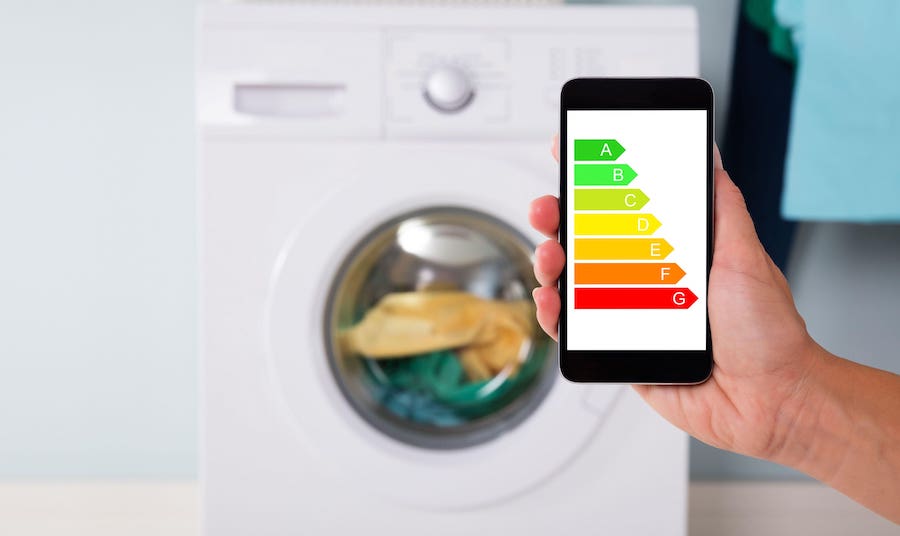7 ways to make your laundry less harmful to the environment
Eco-friendly ‘clean washing’ is where it’s at
There are wash days… and there are wash days.
It’s not so much hand-washing a few of your favourite delicates – it’s the big old loads of heavy washing that have a negative impact on the environment with water and energy waste, and which increase your carbon footprint.

Household staples such as lemon, bicarbonate and vinegar can remove stains naturally
Here, Will Ashton Smith, director of sustainability at Domestic & General, shares his top tips on how to make doing your laundry less harmful to the environment…
1. Wash clothes at 30C
Washing your clothes at 30C, instead of 40C, could reduce the amount of water and heat required, suggests Ashton Smith.

An eco-friendly cycle uses less energy and produces excellent results
“If your laundry has larger stains, avoid opting for a 40C wash and instead try to treat these spots prior to washing to save on energy.”
2. Load your washing machine to around 80% capacity for best efficiency
Ensuring you maximise the amount of laundry washed in a single cycle will help to conserve energy as it simply limits the number of washes needed, he explains.
“However, there is a limit to how much laundry you can load into a washing machine. Overloading the drum strains the machine, making it difficult to clean clothes effectively, which may result in needing a second wash.”
Ashton Smith always recommends loading your washing machine to around 80% capacity for the best results while making efforts to be more sustainable.

Overloading the washing machine has a negative impact on your wash
“An easy way to check this is to place your hand into the top of the washing machine drum – if you can’t do this easily, remove a few items.”
3. Avoid using the pre-wash cycle on your washing machine
“Typically, the pre-wash setting on your machine is there to tackle large and stubborn stains, such as grass or food. Many people still use this setting out of habit, but this step may result in more water and energy usage,” warns Ashton Smith.
“Not only this, but modern appliances – and laundry detergents – have become so technologically advanced, this step is often no longer needed.
“Instead, I would advise to skip this step and spot-treat any stains before washing using a stain remover, or even some eco-friendly washing-up liquid.”
4. Choose eco-friendly detergents

Eco-friendly home cleaning products are readily available
It’s not widely known, but Ashton Smith says many popular and cheap detergent choices can be filled with chemicals that could collectively harm the environment: “Nowadays, larger supermarkets have many eco-friendly brands when it comes to laundry detergent, such as method or Ecover.
“Making this simple switch, where you can, could help reduce the amount of negative environmental impact caused by your weekly laundry routine.”
Eco-friendly options will often also come in recyclable packaging, which is another quick and easy way to make your laundry habits more sustainable,” suggests Ashton Smith.
5. Use an energy-efficient washing machine
If you are looking to replace your washing machine in the near future, he says it’s important to choose one with good energy efficiency.

An eco-friendly washing machine will save money and the environment
“Appliances will come with an EPC (energy performance certificate). Anything above a C is a good choice when considering environmental impact. Not only that, but it may help you pay less on bills while running the machine.”
6. Regularly clean your washing machine
One tip, which is overlooked by many, is to regularly clean the washing machine, notes Ashton Smith. “While the machine itself is used to clean items such as clothing and bedding, it also benefits from being thoroughly cleaned once every month or two.
“Ignoring this step could result in clothing which is not properly cleaned and requires another hot wash. If this is happening frequently, that is a lot of unnecessary extra cycles.”
7. Select the right spin speed for drying
When it comes to the correct spin speed for drying your clothes, Ashton Smith says there are some popular misconceptions. Many believe the quicker the better, while others argue a slower speed is more environmentally friendly.
However, understanding the most sustainable speed depends on your chosen drying method.
“If you are planning to dry your laundry using a tumble dryer, it’s a good idea to select a faster spin cycle on the washing machine.”
He continues. “A faster spin will often use more energy but for a shorter period of time – and leave your laundry damp, rather than soaked. This then means you will be able to choose a shorter time setting on the tumble dryer.”

Drying your washing in the open air is best for the environment
During those hotter and drier summer days, when we can benefit from hanging out laundry to air-dry, he recommends opting for a slower, eco-friendly spin cycle.”
The Press Association
Latest posts by The Press Association (see all)
- Does sunscreen expire? Everything you need to know about SPFs - April 2, 2025
- Top Gun and Batman star Val Kilmer dead at 65 - April 2, 2025
- Actor Richard Chamberlain dies aged 90 - March 30, 2025
- 5 new books to read this week - March 26, 2025
- 6 things a physio wishes people over 60 would stop doing - March 25, 2025




















